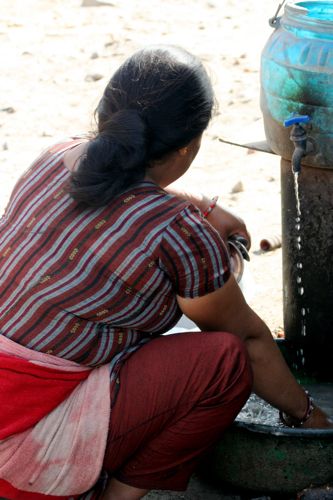A few days after my colleague and I arrived in Nepal, the Prime Minister resigned. Since his departure, street protests have brought the potential for violent clashes and the derailment of a nascent peace process that ended a 10-year Maoist insurgency in 2006. When I showed up at the World Bank office in Kathmandu last week asking about climate change, my interview subject seemed pleasantly surprised.
"Wow," said Claudia Sadoff," it's nice to see people are still interested in the environment."
Sadoff, who is the Bank's lead economist on climate change in South Asia, explained that the day-to-day volatility is something of an existential rub for long-term investment organizations working in the developing world. But even in more developed nations, she said, short-term political calculus is at odds with the long-range planning preparation for climate change will require.
"The time frames we're talking about are so much longer than the political time horizons," she said. "You've always got a tension between immediate results in immediate time frames and trying plan for 50 years down the road."
The recent political crisis has cast uncertainty on just such an effort: a regional summit that Nepal was set to host August 31-Sept. 2 (invitees include Afghanistan, Pakistan, India, Bangladesh, Bhutan, Sri Lanka, and the Maldives; donors are Britain, Australia, Denmark, and the World Bank). The conference was designed to develop a South Asian consensus about how to deal with climate change in the months before a global summit this December in Copenhagen.
"This region is really very iconic in terms of the dangers of climate change," said Sadoff. "The Maldives could disappear. You've got real glacier issues. And then there's the monsoon, in this most-heavily populated basin in the world." Nepal's massive glaciers are melting at an alarming rate and its rural communities, where safe water for drinking and sanitation are in short supply, are alternately flooded then drought-stricken as climate change wreaks seasonal havoc on the monsoon cycle.
Sunil Pant, a member of Nepal's parliament, helped plan the regional conference. "Rich countries have contributed to global warming by their carbon emissions and economic development, but a country like Nepal is almost carbon neutral," he said. "Proportionately we contribute almost nothing to global warming, but the challenges we face due to future climate change is severe."
Along with a group of young lawmakers, he says, Pant formed the Parliamentary Action Team on the Environment, Climate Change, and Disaster Risk Reduction. A few months ago, they went into rural villages to hear form those affected by the increasingly-erratic monsoon. "I talked to an old woman who lost everything due to flooding," he told me. "She said she doesn't understand nature anymore because nature is acting mad."
Pant says he sees a strong link between the environment and politics. "We've seen a few states in India have fought for decades over water in rivers as. So water is going to be a big issue – how societies can live peacefully or fight each other."
Conversely, he says the political situation is affecting the environment. "Because of the political uncertainty, illegal logging has been skyrocketing Nepal, so we're losing forests much faster," he said.
For now, Pant says he's hoping the conference will not be delayed-- the environment, he says, deserves to be a political priority. "We all want economic progress," he said, "but it's also probably time for us to realize how we can progress towards economic development and protect the environment for future generations at the same time."
